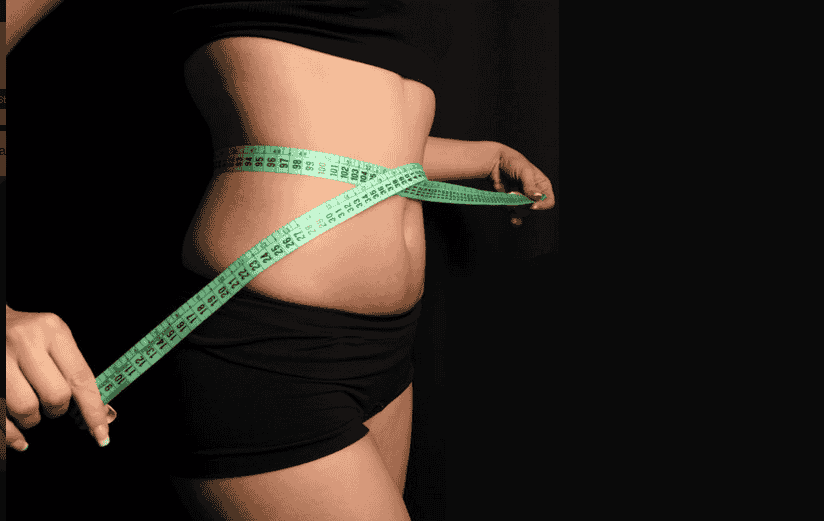1. What is PCOS?
Polycystic Ovary Syndrome (PCOS) is a common hormonal disorder in women of reproductive age. Characterized by a combination of symptoms such as irregular menstrual cycles, excess androgen levels, and the presence of small cysts in the ovaries, PCOS can lead to a variety of health problems, including difficulty in losing weight and the development of insulin resistance. While the exact cause of PCOS remains unknown, it is often linked to both genetic and environmental factors.
One of the primary concerns among women with PCOS is the accumulation of belly fat. This excess fat in the abdominal area is not just a cosmetic issue but also contributes to significant health risks.
2. How Does PCOS Cause Belly Fat?
2.1 Hormonal Imbalance
The hallmark of PCOS is a disruption in hormonal balance. Women with PCOS often have elevated levels of androgens (male hormones), such as testosterone, which can trigger the storage of fat in the abdominal area. This hormonal imbalance makes it more challenging to lose weight and increases the likelihood of fat accumulation around the midsection.
2.2 Insulin Resistance
Insulin resistance is a common issue for women with PCOS. When the body becomes less responsive to insulin, it tries to compensate by producing more insulin. This excess insulin can lead to weight gain, particularly around the abdomen, where fat cells are more insulin-sensitive. Insulin resistance further exacerbates hormonal imbalances, creating a vicious cycle of weight gain and difficulty losing fat.
2.3 Chronic Inflammation
Chronic inflammation is another factor that contributes to belly fat in women with PCOS. Inflammation leads to hormonal imbalances and can interfere with the body’s ability to metabolize fat properly. In women with PCOS, low-grade inflammation is often present, making it harder to lose weight, especially around the abdominal area.
3. Why is Belly Fat Different in PCOS?
3.1 Visceral vs. Subcutaneous Fat
Belly fat can be divided into two categories: visceral fat and subcutaneous fat. Visceral fat is located deeper in the abdomen, surrounding internal organs, while subcutaneous fat is found just beneath the skin. Women with PCOS are more prone to storing visceral fat, which is more dangerous than subcutaneous fat because it increases the risk of metabolic diseases such as diabetes and heart disease.
3.2 Metabolic Risks of Visceral Fat
Visceral fat is more metabolically active and releases inflammatory compounds that can further worsen insulin resistance and hormonal imbalances. This creates a cycle where PCOS belly fat contributes to worsening PCOS symptoms, increasing the risk of conditions like cardiovascular disease and type 2 diabetes.
4. The Role of Insulin Resistance in PCOS Belly Fat
Insulin resistance is a key driver of belly fat in PCOS. When the body becomes resistant to insulin, glucose is not effectively used by cells for energy. Instead, it gets stored as fat, particularly around the abdominal area. Over time, this excess fat contributes to more severe insulin resistance, which further aggravates weight gain and makes it even harder to lose fat.
Women with PCOS are often caught in a cycle of insulin resistance and belly fat accumulation, leading to a higher risk of developing other health complications.
5. Hormonal Imbalance and Weight Gain in PCOS
Hormonal imbalances, particularly elevated levels of androgens like testosterone, contribute significantly to weight gain in women with PCOS. Androgens promote fat storage, especially in the abdominal region. These hormonal changes make it more difficult for women with PCOS to burn fat and lose weight.
Additionally, PCOS disrupts other hormones, including leptin and ghrelin, which regulate appetite and satiety. This disruption can lead to increased cravings, overeating, and difficulty adhering to a healthy diet, further complicating weight loss efforts.
6. Dietary Strategies to Combat PCOS Belly Fat
Diet plays a crucial role in managing PCOS belly fat. Since insulin resistance is a major factor, it’s important to focus on a diet that helps stabilize blood sugar levels and reduce inflammation.
6.1 Low-Glycemic Index Foods
Choosing foods with a low glycemic index (GI) can help prevent blood sugar spikes and regulate insulin levels. Low-GI foods, such as whole grains, legumes, and non-starchy vegetables, are digested slowly, which helps keep blood sugar levels stable and prevents the body from storing excess fat.
6.2 Anti-Inflammatory Diet
An anti-inflammatory diet is also beneficial for women with PCOS. Foods rich in antioxidants, omega-3 fatty acids, and fiber can help reduce inflammation and promote weight loss. Incorporating plenty of fruits, vegetables, nuts, seeds, and fatty fish into your diet can aid in reducing PCOS belly fat.
6.3 Protein-Rich Meals
Protein is essential for managing PCOS belly fat as it helps stabilize blood sugar levels and promotes satiety. Incorporating lean proteins such as chicken, turkey, tofu, and fish into meals can reduce cravings and prevent overeating, which can lead to fat accumulation.
7. Exercise Plans for Reducing Belly Fat in PCOS
Physical activity is critical for reducing belly fat in women with PCOS. Exercise helps improve insulin sensitivity, balance hormones, and promote overall fat loss, particularly in the abdominal area.
7.1 Strength Training
Strength training is one of the most effective forms of exercise for women with PCOS. Building muscle helps increase metabolism and burn fat, especially visceral fat. Lifting weights or doing bodyweight exercises like squats, lunges, and push-ups can be beneficial in reducing belly fat.
7.2 High-Intensity Interval Training (HIIT)
HIIT workouts are another powerful tool for tackling PCOS belly fat. These short bursts of intense exercise followed by brief rest periods help burn fat more efficiently and improve insulin sensitivity. Incorporating HIIT into your exercise routine a few times a week can accelerate fat loss and improve overall fitness.
7.3 Yoga and Pilates
Yoga and Pilates may not be as intense as strength training or HIIT, but they offer numerous benefits for women with PCOS. These forms of exercise help reduce stress, improve flexibility, and promote core strength, which can support belly fat reduction.
8. Managing Stress to Reduce Belly Fat
Stress management is a key component of reducing belly fat in women with PCOS. Chronic stress increases levels of the hormone cortisol, which has been linked to fat storage, particularly in the abdominal region.
8.1 Cortisol and PCOS
Women with PCOS often have elevated cortisol levels due to the stress their bodies endure from hormonal imbalances. High cortisol levels increase the body’s propensity to store fat, particularly visceral fat, which worsens belly fat and increases health risks.
8.2 Stress-Relief Techniques
Incorporating stress-relief techniques such as meditation, deep breathing exercises, and mindfulness practices can help reduce cortisol levels and improve hormonal balance. Even small efforts like practicing gratitude, journaling, or taking short walks can help mitigate the effects of stress and reduce belly fat.
9. Medical Treatments for PCOS Belly Fat
In some cases, lifestyle changes may not be enough to manage PCOS belly fat, and medical treatments may be necessary. Consulting with a healthcare provider can provide insights into effective treatment options tailored to individual needs.
9.1 Medications
Common medications for managing PCOS include hormonal contraceptives, anti-androgen medications, and insulin-sensitizing drugs like metformin. These medications help regulate hormones, improve insulin sensitivity, and reduce fat accumulation, particularly in the abdominal area.
9.2 Supplements
Certain supplements may also support belly fat reduction in women with PCOS. Inositol, for example, has been shown to improve insulin sensitivity and reduce androgen levels. Omega-3 supplements, magnesium, and vitamin D are also commonly recommended for managing PCOS symptoms, including weight gain.
10. Sleep’s Impact on PCOS and Belly Fat
Sleep plays a vital role in managing PCOS belly fat. Poor sleep can lead to hormonal imbalances that increase appetite and cravings, making it harder to lose weight. Studies have shown that inadequate sleep can increase insulin resistance, exacerbate PCOS symptoms, and lead to more belly fat.
Prioritizing quality sleep by maintaining a consistent sleep schedule, creating a relaxing bedtime routine, and limiting screen time before bed can have a significant impact on managing PCOS belly fat.
11. Lifestyle Changes for Long-Term Success
Sustainable lifestyle changes are key to managing PCOS belly fat in the long term. Focusing on a balanced diet, regular exercise, stress management, and sufficient sleep can help women with PCOS achieve lasting results. It’s essential to remember that weight loss with PCOS may take time, and consistency is more important than quick fixes.
12. Myths About PCOS and Weight Loss
There are many myths surrounding weight loss in women with PCOS, particularly regarding belly fat. One common misconception is that women with PCOS cannot lose weight, but this is not true. While it may be more challenging, with the right strategies, women with PCOS can successfully reduce belly fat and improve their health.
Another myth is that extreme dieting or cutting out entire food groups is necessary for weight loss. In reality, a balanced, nutritious diet combined with regular exercise is the most effective and sustainable approach to managing PCOS belly fat.
13. FAQs
Can you get rid of belly fat with PCOS?
Yes, it is possible to reduce belly fat with PCOS, though it may require more effort than in women without the condition. A combination of a balanced diet, regular exercise, stress management, and medical treatment can help.
Is PCOS belly fat more difficult to lose than regular belly fat?
Belly fat in women with PCOS can be more challenging to lose due to hormonal imbalances and insulin resistance, but with the right approach, it can be managed.
What supplements help reduce belly fat in PCOS?
Supplements like inositol, omega-3 fatty acids, vitamin D, and magnesium can support weight loss and improve insulin sensitivity, helping reduce belly fat in women with PCOS.
How long does it take to lose belly fat with PCOS?
The timeline for losing belly fat with PCOS varies depending on individual factors like diet, exercise, and hormonal balance. However, consistent lifestyle changes can result in gradual and sustainable fat loss over time.
Does medication help in reducing PCOS belly fat?
Medications such as metformin and hormonal contraceptives can help regulate insulin levels and reduce belly fat in women with PCOS.
Can lifestyle changes alone manage PCOS belly fat?
In many cases, lifestyle changes such as a healthy diet, regular exercise, and stress management can effectively manage PCOS belly fat. However, some women may require additional medical interventions.


